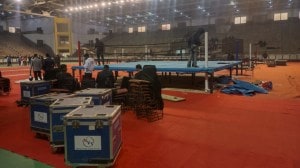Another Tibetan sets himself on fire in China
The incident would bring the number of monks,nuns and lay Tibetans who have set themselves on fire over the last year,to 17.
Another Tibetan has set himself on fire in western China to protest government policies while thousands marched in another part of China to show support for their exiled spiritual leader,the Dalai Lama.
U.S.-funded Radio Free Asia said a monk,set himself on fire in Sichuan province8217;s Aba prefecture on Wednesday and was taken away by soldiers and police. Reportedly,the man shouted slogans before setting himself ablaze,citing a statement from Losang Yeshe and Kanyag Tsering,exiled Tibetan monks in India.
If confirmed,the incident would bring to at least 17 the number of monks,nuns and lay Tibetans who have set themselves on fire over the last year,mostly in traditionally Tibetan areas of Sichuan province. There were reports of three other self-immolations on Friday but the government has denied them and there are doubts within the exile community.
Most of those who have set themselves on fire have chanted for Tibetan freedom and the return of the Dalai Lama,who fled to India amid an abortive uprising against Chinese rule in 1959.
Beijing accuses the Dalai Lama and his supporters of encouraging the immolation.
The broadcaster said protesters shouted slogans and carried banners calling for a 8221;free Tibet8221;,the release of all Tibetan political prisoners,and the return of the Dalai Lama.
Amateur video shot on Wednesday and shared with The Associated Press by a person with contacts in China8217;s Tibetan community showed hundreds of Tibetans gathered on the side of a main street in Nangqian,some sitting on the curb and others milling about.
The person who sent the video said the group later gathered at a stadium and chanted slogans before being surrounded by police and the demonstration broke up without incident after it became dark.In recent protests in Sichuan,the Tibetan activist groups said at least six Tibetans were killed when police fired on protesters. The Chinese government says two rioters died and 24 police and firefighters were injured when rock-wielding Tibetan separatists attacked police stations.
This has been the region8217;s most violent period since 2008,when deadly rioting in Tibet8217;s capital,Lhasa,spread to Tibetan areas in adjoining provinces. China responded then by flooding the area with troops and closing Tibetan regions entirely to foreigners for about a year.
Lobsang Sangay,the leader of Tibetans8217; self-declared exile government,said on Wednesday that convoys of Chinese security forces have been seen moving toward Tibet in recent days,ahead of the Tibetan New Year on Feb. 22 and the March anniversary of the failed 1959 uprising.
8221;If the Chinese government think that the Tibet issue can be solved through violence,intimidation,then it8217;s not going to happen,because the Tibetan spirit is strong,8221; he said in Dharmsala,India.
China has vowed to crack down on the unrest and accuses overseas activist groups and the Dalai Lama of fomenting the violence.When asked about the recent spread of instability in Tibetan areas,Deputy Foreign Minister Cui Tiankai told reporters that China has a responsibility to protect 8221;lives and property and to curb violent criminal activities.8221; He also rebuffed the idea of the unrest as a human rights concern.
The official Tibet Daily on Thursday reported,Tibet8217;s Communist Party secretary,Chen Quanguo,announced at a meeting on Wednesday that four officials from the Chamdo region had been fired for leaving their posts and threatening stability,though it didn8217;t provide specific details
A regional government notice last week stressed the need for officials in Tibet to be on high alert for unrest had warned that those who failed to carry out security work or maintain stability could be fired or face criminal prosecution.
China says Tibet has been under its rule for centuries,but many Tibetans say the region was functionally independent for most of that time. The Dalai Lama has called greater autonomy for Tibet and denies Beijing8217;s claims that he is a separatist.
- 01
- 02
- 03
- 04
- 05






























